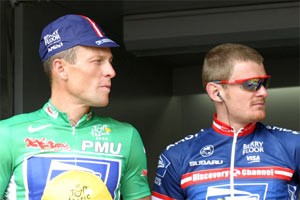Herman claims that Texan Tour winner is being treated unfairly
 Lawyers representing Lance Armstrong have complained about what they claim are unfair offers of amnesty or reduced penalties to riders who are willing to give evidence in the Floyd Landis investigation, specifically against Armstrong himself.
Lawyers representing Lance Armstrong have complained about what they claim are unfair offers of amnesty or reduced penalties to riders who are willing to give evidence in the Floyd Landis investigation, specifically against Armstrong himself.
The so-called ‘sweetheart deal’ would see concessions given to those willing to go on record as saying that they saw, or participated in doping practices on the US Postal team, thus helping to convict those higher up the chain of command.
Armstrong’s lawyer Tim Herman voiced his opposition to the reputed deals, telling the Associated Press that he didn’t consider such an offer to be fair. “USADA is promising riders a sweetheart deal if they can produce anything harmful on Armstrong,” Herman said. “A rider who has doped, they tell them, ‘If you can finger Armstrong, we’ll get out the eraser … and everything is cool.’”
He declined to name those who had been offered such a deal.
The US Anti-Doping Agency didn’t wish to comment on the claim, but said that the goal of the inquiry was to help promote clean sport.
“Our effort in any investigation is a search for the truth, nothing more and nothing less,” said spokesperson Erin Hannan to AP. “On behalf of clean athletes, we will fairly and thoroughly evaluate all evidence of doping to reveal the truth. When the process results in credible evidence of doping, clean athletes can rest assured we will take appropriate action under the rules established by federal law.”
During Floyd Landis’ anti-doping trial in 2007, he claimed that he had been offered a reduced sentence by USADA chief Travis Tygart if he would agree to give evidence about doping by Armstrong. USADA denied that such a deal had been proposed.
At the time, Landis described the offer as ‘offensive’, but earlier this year reversed his claims to have won the 2006 Tour de France clean. He admitted to long-term doping in the past and said that he was introduced to drug use on the US Postal Service team. Email exchanges with USADA, US Cycling and others saw him allege that manger Johan Bruyneel and team co-owner and leader Lance Armstrong had both encouraged and facilitated the practice.
Federal investigators have opened up an inquiry into those claims, and are reportedly keen to speak to former members of the USPS team and others. Tyler Hamilton, who twice failed drug tests, is believed to be negotiating the terms of his testimony, while other un-named riders have been said to have already spoken to investigator Jeff Novitzky, who played a key role in the BALCO case.
If Herman’s claims are true, however, it is not unusual that deals would be offered. The practice has long been carried out in criminal cases, and USADA also has a history of giving reduced penalties to those who give evidence against others who have participated in doping.
According to Virginia attorney William M. Cusmano, the tactic is a common practice. “Getting incentives doesn’t make them liars. It doesn’t make an honest person out of a liar, of course, but it doesn’t make a liar out of an honest person, either,” he told VeloNation.
“Many people need a reason to stick their necks out. If they didn’t get a deal, why would they expose themselves to prosecution by saying anything? That doesn’t make any sense. Sometimes the incentive is only half the pressure — they [prosecutors] will tell you that if you don’t cooperate, you’re left out in the wind, too, and a target.
“It’s common to provide incentives; it’s common to question the incentivized. Who the heck knows? Dirty business all around.”
Herman previously complained about the tactic, claiming in a 2007 letter to the U.S. Olympic Committee that such a deal offer is similar to bribery. He has said that he will voice his concerns to federal investigators.
USADA’s spokesperson Hannan reiterated that the agency acts in the correct manner. She said that USADA considers all athletes “innocent until and unless proven otherwise through the established legal process.”
In what may be a reference to Herman’s complaints, she added that “attempts to sensationalize or exploit either the process or the athletes are a disservice to fair play, due process, and to those who love clean sport.”